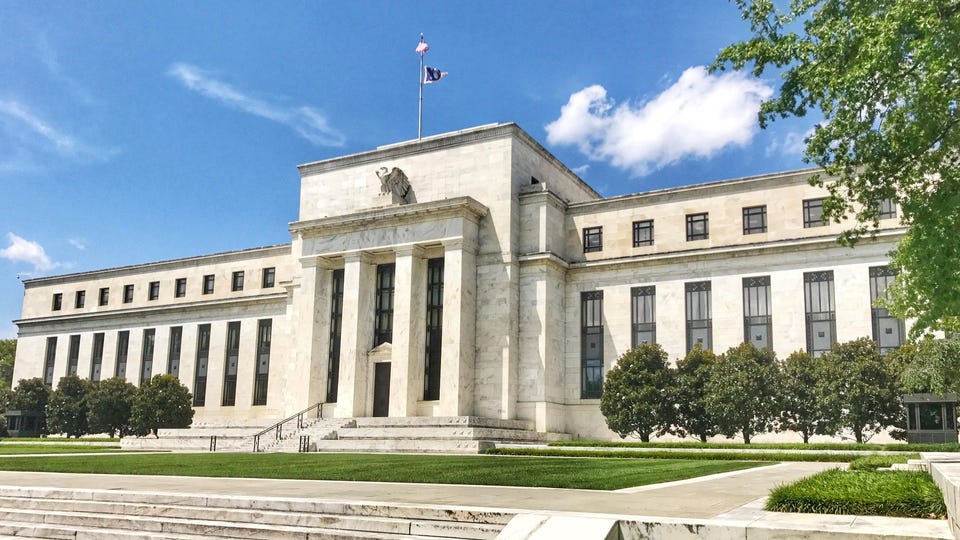Policy The Federal Reserve Could Have Avoided Our Current Inflationary Crisis Ike Brannon Contributor Opinions expressed by Forbes Contributors are their own. Ike Brannon is a senior fellow at the Jack Kemp Foundation New! Follow this author to improve your content experience. Got it! Jul 21, 2022, 09:30am EDT | Share to Facebook Share to Twitter Share to Linkedin For months, American consumers have felt the pinch of inflation in all aspects of their lives, which has increased the cost of food, gas, rent, and other essentials.
The Federal Reserve is now scrambling to tamp down inflation expectations with nearly unprecedented increases in the discount rate after waiting too long to respond to an overheating economy. While the impact of the Fed’s hesitation is under the microscope at the moment – including year-over-year inflation at a forty year high – what should be of greater focus is the impact of inflation and the Fed’s decision-making on low-income communities. With the price of goods accelerating, inflation has now become the number one challenge facing American families, according to the Biden Administration.
A recent analysis from Moody’s found that U. S. households are spending an additional $341 each month solely due to inflation.
At the same time, personal savings fell to their lowest level in nearly a decade . Mortgage interest rates have doubled in the last year to the highest level since the 1980s. Food prices climbed eleven percent in the last year and the price of a gallon of gas has eclipsed $4 per gallon in all 50 states for the first time in U.
S. history. Two-thirds of American families report that their income can’t keep up with the cost of living.
This did not have to occur: The Federal Reserve could have acted sooner and swifter to blunt inflation without risking a post-pandemic slowdown. Former Fed Chair Ben Bernanke criticized the Fed for not acting sooner to tame inflation, and former Fed Governor Donald Kohn also pointed out the flaws in the Fed framework that complicated its battle with inflation and also for not anticipating challenging situations (such as our current one). Former Dallas Fed President Robert Kaplan warned about the dangers of policymaking that wasn’t flexible to changing economic conditions and dissented from the interest rate guidance the Fed adopted in 2020.
Kaplan argued for Fed policymaking to pay special attention to inflation’s potential impact on the poor and working class, remarking that ”what we’re seeing in these communities is inflation affects them disproportionately. ” MORE FOR YOU Biden’s Proposed IRS Bank Account Snooping Authority Runs Into State Resistance 2021 Diversity Green Card Lottery Winners To Be Shut Out Because Of Visa Deadline The Swamp Grew – Even Under President Donald Trump A recent Washington Post analysis found that of the categories of goods and services with the highest level of inflation, lower earners spend a greater share of their total spending on most of them, from natural gas to beef. It is instructive to reflect on the last two years of Federal Reserve policy making.
In the early days of the COVID-19 pandemic, the Fed sprang into action by lowering interest rates and succeeded in steadying the economy and stock market, and the pandemic-induced economic decline was brief. However, two years later the swift and decisive action by the Fed seems like ancient history, and it is now grasping to keep up with events. The Federal Reserve’s hesitation to combat inflation was undoubtedly well-intentioned, knowing that had they acted too soon and too aggressively they could have nudged the economy into a recession, which would have disproportionately impacted the low-income and working-class households.
And one thing we have learned in the last three decades is that when the unemployment rate falls below four percent we tend to see accelerating wage gains at the bottom of the income distribution. The Fed was naturally loath to take any action that might curtail that. But the Fed’s hesitation to constrain its monetary stimulus has a disproportionate impact on those low-income cohorts as well, unfortunately, and that is what we are observing now.
Follow me on Twitter or LinkedIn . Ike Brannon Editorial Standards Print Reprints & Permissions.
From: forbes
URL: https://www.forbes.com/sites/ikebrannon/2022/07/21/the-federal-reserve-could-have-avoided-our-current-inflationary-crisis/
